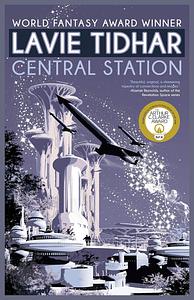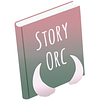You need to sign in or sign up before continuing.
Take a photo of a barcode or cover
No plot, no resolution. The setting, a city at the base of a huge spaceport is described as sprawling and bustling, but feels small and empty. Chapters follow a handful of characters who all know each other or are related. We seldom venture off of one random neighborhood street. Very few descriptions of background characters or activity.
Some of my favourite books, science-fiction or otherwise, are the ones where, after you finish them, you can close your eyes and still "remember" the places you visited, their relationships to other places and the visceral elements (the smells, the tastes, the energy) of the place. [a:Paolo Bacigalupi|1226977|Paolo Bacigalupi|https://images.gr-assets.com/authors/1375566282p2/1226977.jpg]'s Bangkok from [b:The Windup Girl|6597651|The Windup Girl|Paolo Bacigalupi|https://i.gr-assets.com/images/S/compressed.photo.goodreads.com/books/1278940608l/6597651._SY75_.jpg|6791425], [a:P. Djèlí Clark|15117586|P. Djèlí Clark|https://images.gr-assets.com/authors/1638309414p2/15117586.jpg]'s Cairo from [b:The Haunting of Tram Car 015|36546128|The Haunting of Tram Car 015 (Dead Djinn Universe, #0.3)|P. Djèlí Clark|https://i.gr-assets.com/images/S/compressed.photo.goodreads.com/books/1537226167l/36546128._SY75_.jpg|58277622] and of course the sprawling Castle from [b:Gormenghast|258392|Gormenghast (Gormenghast, #2)|Mervyn Peake|https://i.gr-assets.com/images/S/compressed.photo.goodreads.com/books/1480786154l/258392._SY75_.jpg|3599885]. The latter I think is a most apt comparison in this case as this book's title is quite accurate! This book is essentially a glorious world-building exercise, deftly sketching the eponymous station via stories whose characters all move in tangential but interrelated plot-arcs.
Whilst Central Station is the star of the show (and I did wonder to myself just why it was necessary to map out the relatively limited environs that make up the station) there are a number of other characters that pass through the story. This is actually the only real gripe I have about the book: although there are a huge number of concepts and characters that we get a glimpse of, it's just a glimpse. The viewfinder is pointed squarely on Central Station and if the character steps out of frame, well, so be it. Prepare yourself for no closure on any of the subplots relating to character or history.
Central Station is the first (only?) space-elevator built by humanity and is located smack in the middle of the Tel Aviv. It's location is, I suspect, a function of chance history - something that is alluded to but not specifically defined in the book. This is one of the relatively rare post-singularity...that's all I wrote, another one on the forgot-to-review shelf.
Whilst Central Station is the star of the show (and I did wonder to myself just why it was necessary to map out the relatively limited environs that make up the station) there are a number of other characters that pass through the story. This is actually the only real gripe I have about the book: although there are a huge number of concepts and characters that we get a glimpse of, it's just a glimpse. The viewfinder is pointed squarely on Central Station and if the character steps out of frame, well, so be it. Prepare yourself for no closure on any of the subplots relating to character or history.
Central Station is the first (only?) space-elevator built by humanity and is located smack in the middle of the Tel Aviv. It's location is, I suspect, a function of chance history - something that is alluded to but not specifically defined in the book. This is one of the relatively rare post-singularity...that's all I wrote, another one on the forgot-to-review shelf.
Plot or Character Driven:
Character
Strong character development:
No
Loveable characters:
Yes
Diverse cast of characters:
Yes
Flaws of characters a main focus:
Yes
dark
mysterious
reflective
slow-paced
Plot or Character Driven:
Character
Strong character development:
No
Diverse cast of characters:
Yes
emotional
hopeful
mysterious
reflective
medium-paced
Plot or Character Driven:
Plot
Strong character development:
Yes
Loveable characters:
Yes
Diverse cast of characters:
Yes
Flaws of characters a main focus:
Complicated
Fantastic work by Tidhar and one that I'm going to be thinking about for years to come. Not a shock that it won the World Fantasy award by a longshot.
Such a vividly painted extraordinarily good world building, and intertwining stories. I want to know more of the universe.
adventurous
challenging
emotional
hopeful
slow-paced
Plot or Character Driven:
Character
Strong character development:
Yes
Loveable characters:
Yes
Diverse cast of characters:
Yes
Flaws of characters a main focus:
No
Like scanning through the radio stations of a fascinating city. This world is boldly imagined and gives the impression that the author has thought through all the interconnecting strings for many hours, yet is also confident enough in the intrigue not to info-dump.
While a few plot threads, like the children, come together thrillingly, the book is more slice-of-life. Its lessons surround accepting what we cannot change and living with mistakes and missed opportunities. At the end of the book lies a list of all the places individual chapters were published previously as standalone short stories. I understand many we refactored to form a cohesive narrative but the fragmented nature still left me unable to get into any one characters' skin as much as I was hoping too. For their small page time, the development is impressive, but one can only do so much with so many interesting characters jostling for attention. The setting is the main character of this book, and it is a delight of the imagination, but personally, I would have found it a smoother read if the setting was delivered on the backs of a few main characters.
While a few plot threads, like the children, come together thrillingly, the book is more slice-of-life. Its lessons surround accepting what we cannot change and living with mistakes and missed opportunities. At the end of the book lies a list of all the places individual chapters were published previously as standalone short stories. I understand many we refactored to form a cohesive narrative but the fragmented nature still left me unable to get into any one characters' skin as much as I was hoping too. For their small page time, the development is impressive, but one can only do so much with so many interesting characters jostling for attention. The setting is the main character of this book, and it is a delight of the imagination, but personally, I would have found it a smoother read if the setting was delivered on the backs of a few main characters.
This is one of the most interesting, strange, beautiful books I’ve ever read.
As a reading experience, Central Station is confusing, with dense prose and complex, often unexplained, ideas. It follows multiple connected but separate characters and stories, each with their own theme and focus. Considering the book is essentially a collection of revamped short stories, this makes sense. It might be a turn off for some, but the way this book jumps between character and story helps to serve its actual goal: to put you in the world of Central Station.
As an effort in world building, Central Station is a masterclass.
The titular Central Station is a spaceport in Tel Aviv, in a future where there is no longer conflict between Israelis and Palestinians. What emerges after is a world of connections and broken barriers, where binaries are deconstructed.
Across this world, Tidhar plays with the idea of deconstructed binaries or multiple states of being. Past, present and future, differing religions and nationhood, digital and material, virtual and physical, terrestrial and extraterrestrial, man and robot, human and other - all are merged and connected in ways vastly alien to our current world.
The concepts of the Conversation - an internet accessed via a bodily node which connects all people at all times and creates a virtual second world - and virtual gameworlds - which people stay in more than real world - reinforce these ideas, highlighting the thin line between the real and virtual. Even Israel itself has merged into joint state, where nationality and religion are no longer the cause of conflict or strife.
Within this we have some truly great character concepts - a robot who is both faithless and a religious figure, a broken cyborg war veteran in love with a young, gameworld obsessed woman, a family literally trapped in their collective past, a book collector unable to access the Conversation, a data vampire looking to be accepted. Many of these stories are primed to explore concepts around faith, reality, addiction, personhood, disability (as a social concept) or belonging.
It is a truly enticing world from which thousands of stories could be told.
This book is aiming for concept, feeling and character over hard science fiction and plot, which is a shame at first. In using such poetic language, the finer elements of the stories - often such as what is happening - can be lost, and some sections were more of a slog in that respect than others. On the other hand, it all feels in serve of a theme, idea or concept. Everything here feels deliberate and planned, to exist alongside the collective jumble that is the world of Central Station.
I highly recommend this book whilst simultaneously not understanding all of it and knowing it is not for everyone
As a reading experience, Central Station is confusing, with dense prose and complex, often unexplained, ideas. It follows multiple connected but separate characters and stories, each with their own theme and focus. Considering the book is essentially a collection of revamped short stories, this makes sense. It might be a turn off for some, but the way this book jumps between character and story helps to serve its actual goal: to put you in the world of Central Station.
As an effort in world building, Central Station is a masterclass.
The titular Central Station is a spaceport in Tel Aviv, in a future where there is no longer conflict between Israelis and Palestinians. What emerges after is a world of connections and broken barriers, where binaries are deconstructed.
Across this world, Tidhar plays with the idea of deconstructed binaries or multiple states of being. Past, present and future, differing religions and nationhood, digital and material, virtual and physical, terrestrial and extraterrestrial, man and robot, human and other - all are merged and connected in ways vastly alien to our current world.
The concepts of the Conversation - an internet accessed via a bodily node which connects all people at all times and creates a virtual second world - and virtual gameworlds - which people stay in more than real world - reinforce these ideas, highlighting the thin line between the real and virtual. Even Israel itself has merged into joint state, where nationality and religion are no longer the cause of conflict or strife.
Within this we have some truly great character concepts - a robot who is both faithless and a religious figure, a broken cyborg war veteran in love with a young, gameworld obsessed woman, a family literally trapped in their collective past, a book collector unable to access the Conversation, a data vampire looking to be accepted. Many of these stories are primed to explore concepts around faith, reality, addiction, personhood, disability (as a social concept) or belonging.
It is a truly enticing world from which thousands of stories could be told.
This book is aiming for concept, feeling and character over hard science fiction and plot, which is a shame at first. In using such poetic language, the finer elements of the stories - often such as what is happening - can be lost, and some sections were more of a slog in that respect than others. On the other hand, it all feels in serve of a theme, idea or concept. Everything here feels deliberate and planned, to exist alongside the collective jumble that is the world of Central Station.
I highly recommend this book whilst simultaneously not understanding all of it and knowing it is not for everyone
challenging
emotional
hopeful
mysterious
reflective
slow-paced
Plot or Character Driven:
A mix
Strong character development:
Yes
Loveable characters:
Complicated
Diverse cast of characters:
Yes
Flaws of characters a main focus:
N/A





